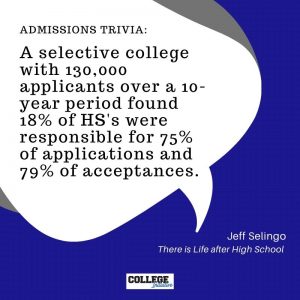What Do You Know About High School Profiles?
Last Updated on November 18, 2024 by Jill Schwitzgebel
If you are like most people, your answer to the question in the title is “Not much” or even “Nothing.” But, your teen’s high school profile is a factor in college admissions, even if it isn’t often discussed. High school profiles give context to admissions departments when they are reviewing your child’s college applications. It helps them to understand what educational programs have been offered to them and, how your student fit into that academic setting. It will be sent with every transcript that the high school sends to colleges on behalf of your student.

Colleges within your state may already have knowledge of the state’s high schools, their demographics, and their overall academic offerings and performance. If any college anywhere has enough applicants from a certain high school over the years, they likely have an impression of that school. In fact, admissions departments have been criticized for sometimes having favorite high schools – high schools whose graduates are typically successful at their college, so applicants from those schools seem to be more likely to be admitted.
But with tens of thousands of high schools in this country, a detailed high school profile is an invaluable tool for a college to better understand an unfamiliar high school, as well as the applicant. This is why it’s important that you not only know what it is, but that you check it out and make sure that it’s an accurate reflection of your school community.
What Does a Good School Profile Contain?
The profile should be updated annually with the most recent school and demographic statistics. At its most basic, it should explain the school’s grading system, course offerings, and extracurricular offerings. It should also include an overview of the most recent graduating class – the grade distribution, significant awards they received (such as number of National Merit Finalists), standardized test score averages, as well as AP score distributions. It should also specifically mention AP or IB course offerings, as well as their policy on class rank.
A detailed high school profile will note any scheduling restrictions they have in place – for instance, a policy that caps the number of AP classes that can be taken per year or in total. Or, it may explain special prerequisite requirements that they have in place. That could potentially be important information for the college to have when evaluating the student’s rigor of curriculum.
There can be huge differences among high school profiles. Some private schools, as well as some affluent high schools, will have fancy, multi-page brochures. Some schools just present the profile as a list that is rather generic and basic. The College Board actually has also laid out guidelines for what a college profile should contain at a minimum. You can see an example of what I would consider to be a “happy medium” high school profile here.
How Can You Access Your High School Profile?

This varies. Some school districts publish their high school profiles right on their website. Other times, you have to request it, usually from the school guidance office. Some high schools will actually send out a link to their profile at some point during the school year so that parents can review it. The most important thing to know is that it is a public document and you have a right to see it. In fact, you might want to check out multiple years to see what kind of progress your high school is making.
(Hint: If you are considering a move before or during your student’s high school years and are undecided about schools, checking out the school profiles might be helpful.)
If you feel your high school’s profile document is lacking in content, know that part of the reason could be because sometimes schools worry that giving away too much detail about the school performance will cause people to ask too many questions. But that’s usually not doing your student any favors. If you feel that the profile is inadequate or does not represent your high school accurately, speak up and ask some questions!










